Unit 4 Making the news Using language 课件(67张)
文档属性
| 名称 | Unit 4 Making the news Using language 课件(67张) | 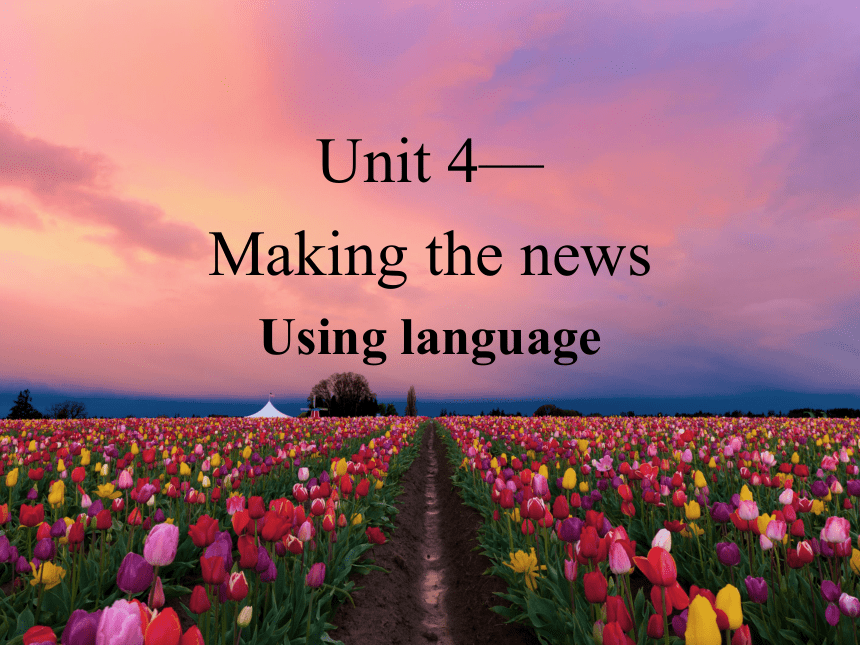 | |
| 格式 | zip | ||
| 文件大小 | 5.5MB | ||
| 资源类型 | 教案 | ||
| 版本资源 | 人教版(新课程标准) | ||
| 科目 | 英语 | ||
| 更新时间 | 2018-07-19 16:00:30 | ||
图片预览

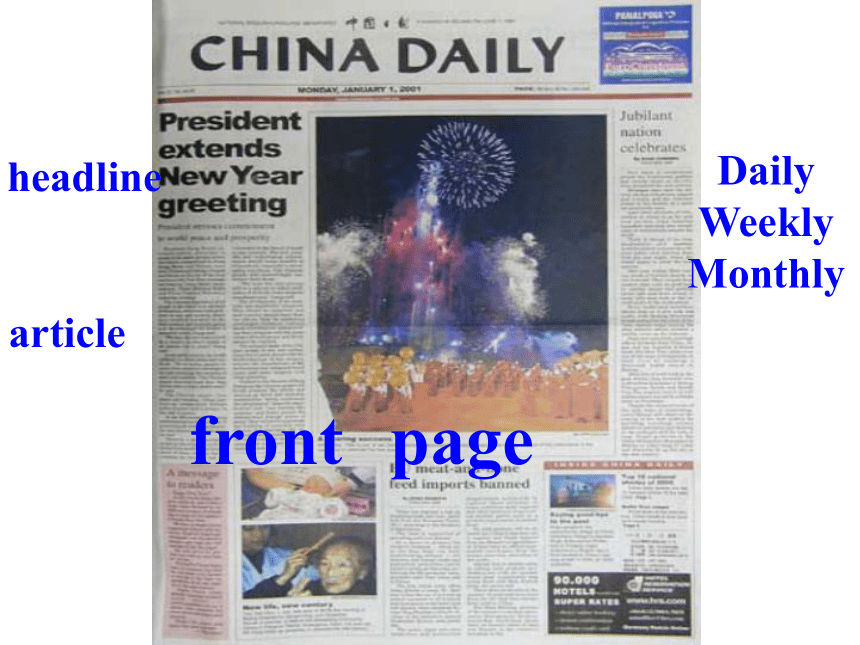
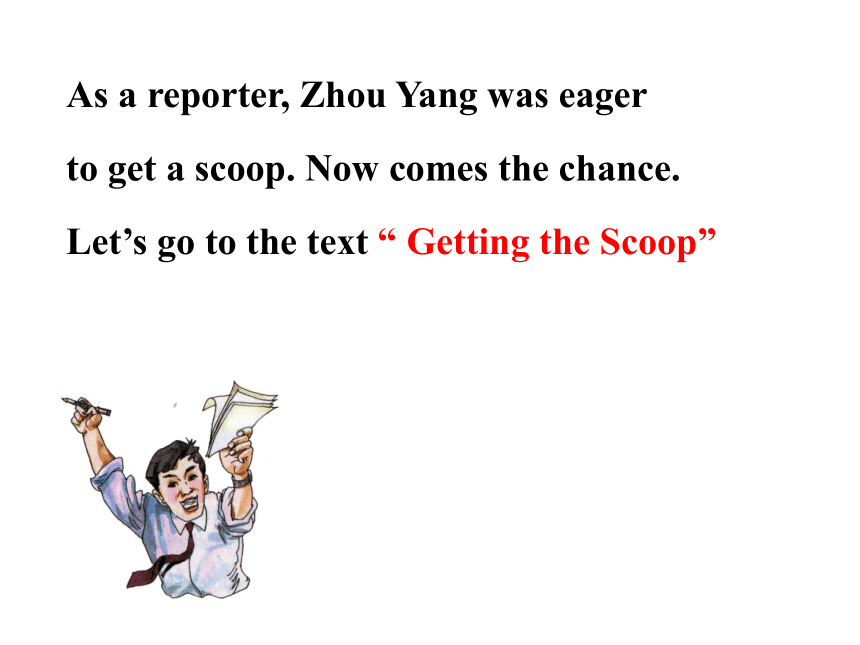
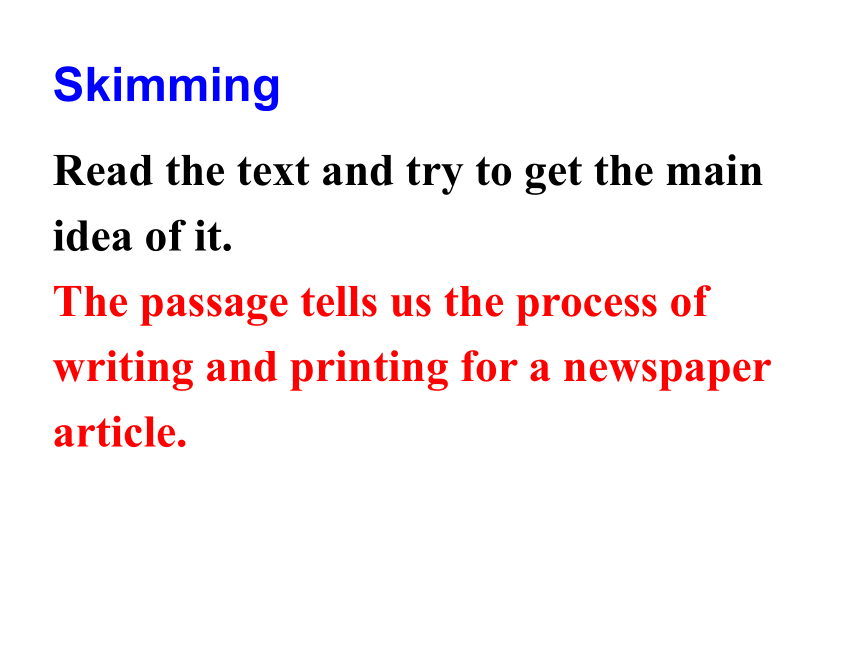
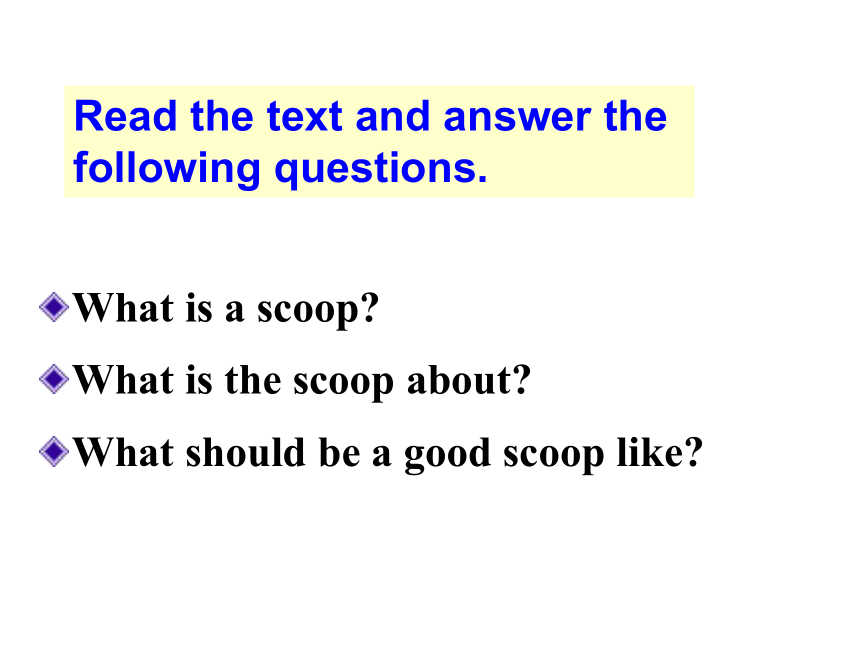
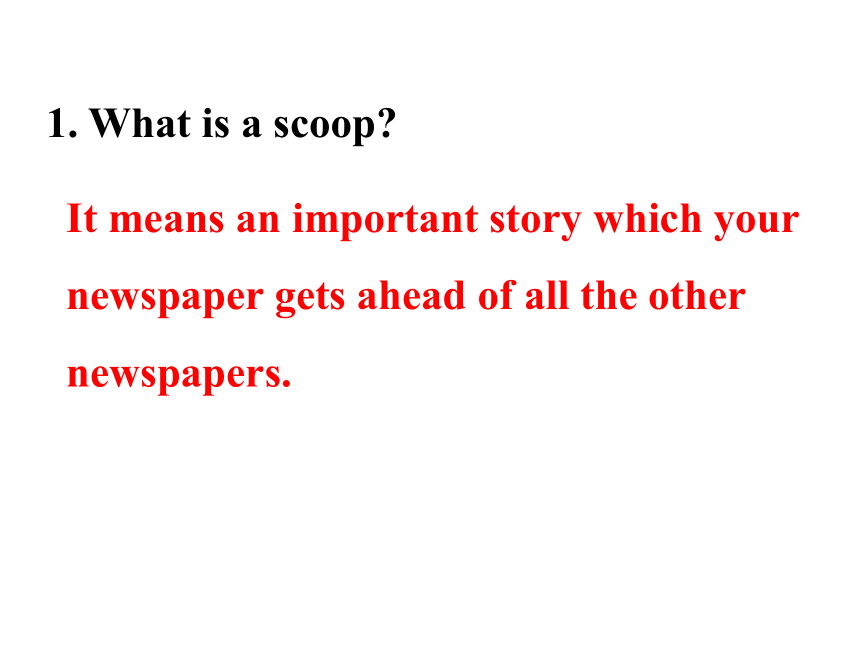
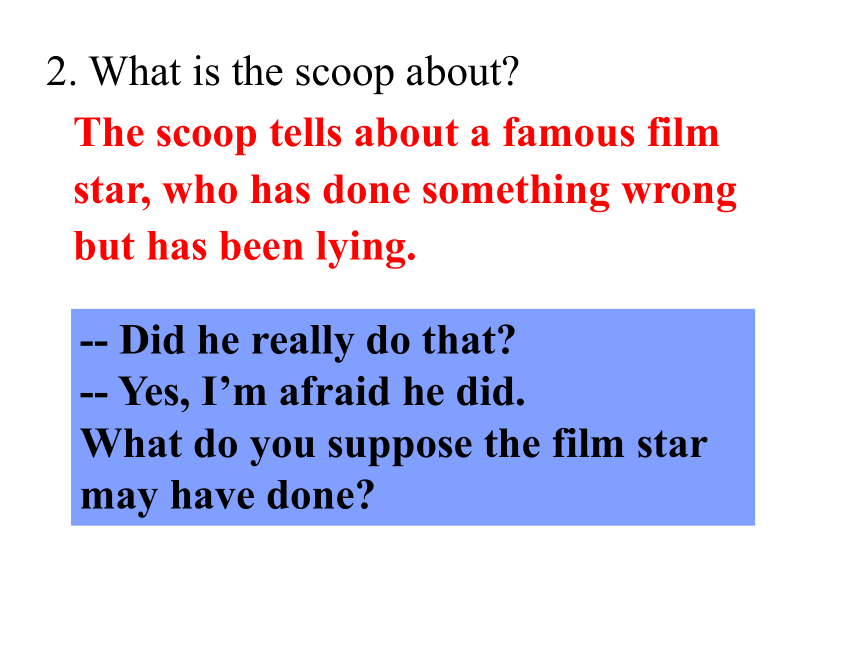
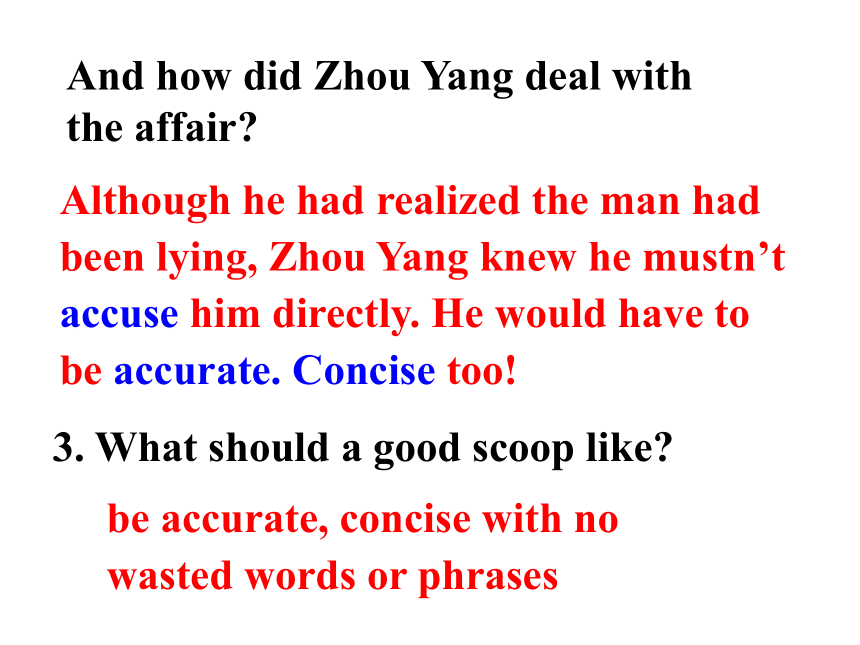
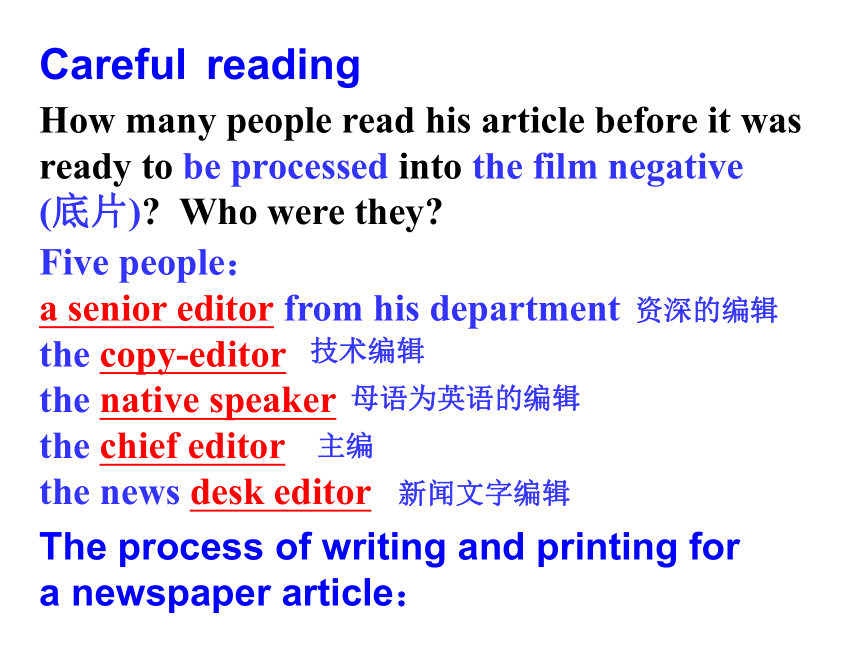
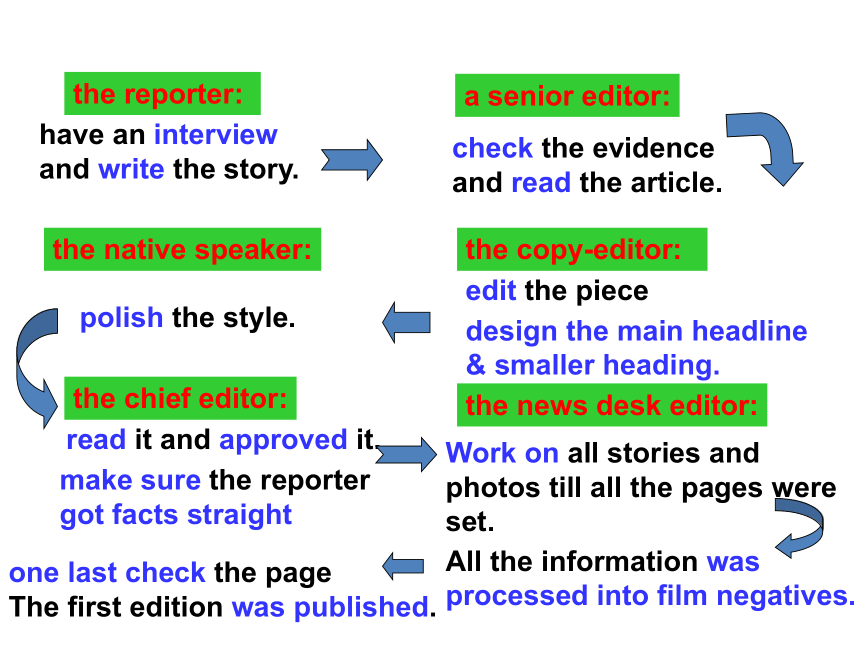
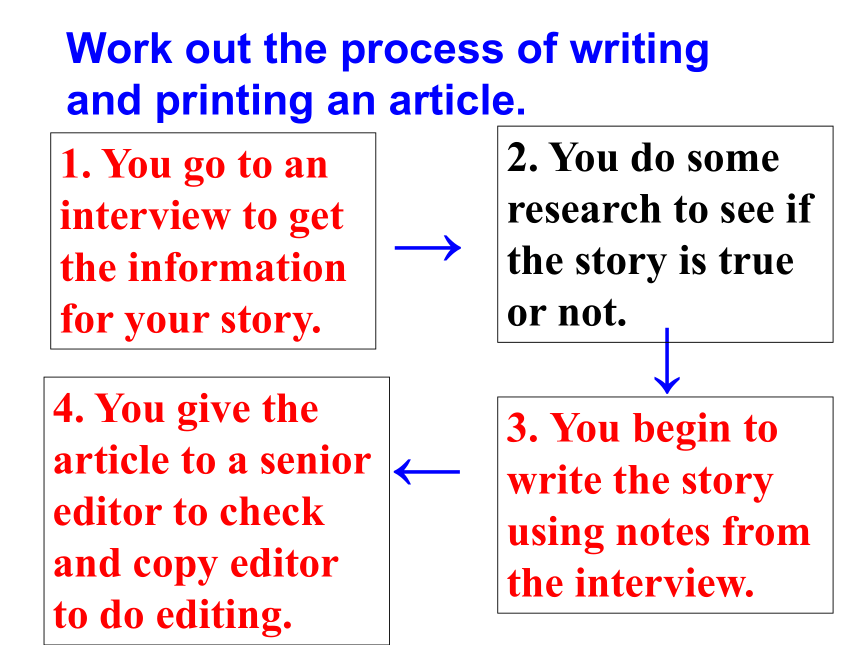
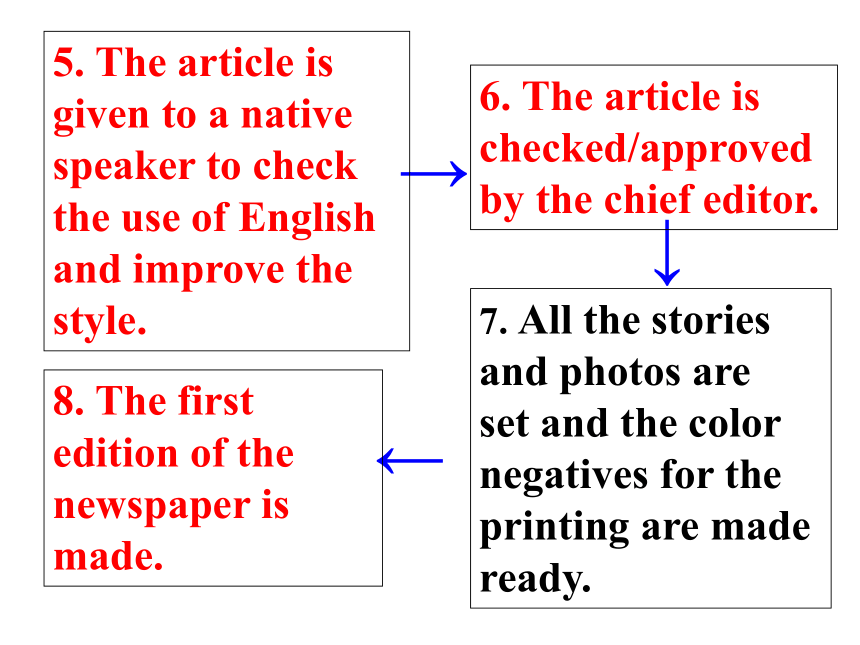
文档简介
课件67张PPT。
Unit 4—
Making the news
Using languageDaily
Weekly
Monthlyarticleheadlinefront pageAs a reporter, Zhou Yang was eager
to get a scoop. Now comes the chance.
Let’s go to the text “ Getting the Scoop”Read the text and try to get the main idea of it.
The passage tells us the process of writing and printing for a newspaper article. SkimmingWhat is a scoop?
What is the scoop about?
What should be a good scoop like?Read the text and answer the following questions.1. What is a scoop? It means an important story which your
newspaper gets ahead of all the other
newspapers.The scoop tells about a famous film
star, who has done something wrong
but has been lying.2. What is the scoop about?-- Did he really do that?
-- Yes, I’m afraid he did.
What do you suppose the film star
may have done? And how did Zhou Yang deal with
the affair?Although he had realized the man had
been lying, Zhou Yang knew he mustn’t
accuse him directly. He would have to
be accurate. Concise too!3. What should a good scoop like?be accurate, concise with no
wasted words or phrasesHow many people read his article before it was
ready to be processed into the film negative
(底片)? Who were they?Five people:
a senior editor from his department
the copy-editor
the native speaker
the chief editor
the news desk editor资深的编辑技术编辑母语为英语的编辑主编新闻文字编辑Careful reading The process of writing and printing for
a newspaper article:have an interview
and write the story.the reporter:check the evidence and read the article.edit the piecethe copy-editor:design the main headline& smaller heading.polish the style.read it and approved it.Work on all stories and
photos till all the pages were
set.All the information was
processed into film negatives.one last check the page
The first edition was published.a senior editor:the news desk editor:the native speaker:the chief editor:make sure the reporter
got facts straight← → →1. You go to an interview to get the information for your story.2. You do some research to see if the story is true or not.3. You begin to write the story using notes from the interview.4. You give the article to a senior editor to check and copy editor to do editing.Work out the process of writing and printing an article. ← → →5. The article is given to a native speaker to check the use of English and improve the style.6. The article is checked/approved by the chief editor. 7. All the stories and photos are
set and the color negatives for the printing are made ready.8. The first edition of the newspaper is made.In pairs make a list of things that the film star might have done. He took money but act badly in a film.
He lied about getting drunk at a restaurant.
He stole something from a shop and
lied about it.
He said some rude remarks about his ex-girlfriend to a journalist.Step 1 dialogue
-- Zhou Yang, the famous film star and two
interviewees.
Pay more attention to the questions to be asked.Talking and WritingStep 2
--Write the scoop according to the dialogue.the main headline at the top and a smaller one under it.
A good article should be written with no wasted words or phrases.A film Star Caught Unexpectedly Did he need the money?There has been a strange happening at a
downtown shopping area. It has been said
that a famous film star, Wang Ping, was
caught stealing a gold necklace yesterday.
He went into a shop and when the jeweler
turned his back, Wang Ping took the necklace
and ran out of the shop. The shopkeeper
shouted and a crowd of people gathered. The police went to Wang Ping’s home and
questioned him. He denied he had stolen the
necklace and said that he had enough money to
buy the necklace anyway. He said he had
been at a restaurant with his wife. But a
reporter, Zhou Yang, found this was untrue.
So the police are treating this case seriously.
1. section 栏, 版, 节, 部分 the sports section
edition 版次, 版数 the 3rd edition of the
novel/a cheap edition/the city edition of
New York Times
editor n. 编辑
edit v. 编辑, 剪辑
edit sth. out of (sth.) 删除Language Pointsissue/number 期数
the latest issue of Newsweek
copy 册数, 副本
six thousand copies of the book
2. gifted 有天赋的
As a gifted musician, he not only can play
music but has a gift for composing, so people
call him a man of many gifts and sent him a
piano as his birthday gift.3. ahead of 在……之前;比……强(好)
我们前面有条河。
北京的时间比新疆早4个小时。
他的思想总是领先于那个时代。
他是班上最优秀的学生。 Ahead of us is a river.The time of Beijing is 4 hours ahead of Xinjiang.His ideas is always ahead of his time.He is ahead of the rest of the class.4. department
(政府, 企业, 商店, 大学等的)部, 司, 局,
处, 科, 部门, 系
the Education Department
the sales departmentget ahead 成功, 发迹, 前进
go ahead 前进, 进行, 继续(事情), (祈使)干吧
(开始吧), 请吧
look ahead 展望(未来), 朝前看5. set to work = get/settle down to work
开始工作
一接到这个任务,我们立即开始了工作。
On receiving the assignment, we immediately
set to work.
The workers set to repairing the bridge.6. concise--Expressing much in few words; cleara concise dictionary 简明词典7. accurate adj. 正确无误的,精确的,准确的
归纳拓展
accuracy n. 准确,精确
precise adj. 精确的,独特的,精细的
exact adj. 正确的,准确的,严谨的,精密的
accurately adv. 精确, 准确
correct adj. 正确的, 准确1) ________ statistics, measurements, calculations, are very important.
2) It’s impossible to say with any ________ how many are affected.
3) This is the ______ dress for a formal dinner.
4) The ____ time is three minutes and thirty-five seconds.Accuratecorrectaccuracyexact5) They both came here at ______ the same time.
6) He is ______ in everything.
7) The diagram had been copied with great ________.
8) He is a man with a ______ mind.precisepreciseexactlyprecision8. senior adj. 年长的, (级别、职位、
资格) 较高的, 高年级的 (作定语)
senior n. 年较长的人, 毕业班或高年
级的学生
junior adj. 较幼的, 较小的
superior adj. 较高的, 优越的, 优良的,
不屈服的注意: 本身都是比较级形式, 无须再添加
more 或-er; 这三个词用于比较级中不与
than 连用, 而与 to 连用。He is not superior to temptation.
他经不住诱惑。
2) This engine is superior in many aspects.
这台发动机在很多方面性能都非常优越。3) He is two years senior to me. 他比我大两岁。
4) I will have to ask my superior. 那事我得先问一下我们公司老板。
5) He is wearing a superior smile. 他脸上带有高傲的微笑。pass sth down (to sb) 把……传给下一代
hand sth down (to sb)
传递某物/将某物传给下一代
hand sth on (to sb) 将某物递给或送交某人9. pass sth on to sb 把……传给某人
We must manage to pass the news of her
death on to her mother.
Pass the letter on to the others in the class.10. polish
Polish (sth) (up) (with sth) 磨光, 擦亮
polish (up) furniture/shoes with a cloth
用布把家具/鞋擦亮
2) (比喻)修正, 修改, 修饰(某事物)
polish a speech/an article
给讲稿/文章润色11. approve v. 赞成, 认可, 满意, 批准, 通过
approval n. 赞成、同意、认可
on approval
(指货物) 不满意可以退换的
approving adj. 赞许的、认可的
approved school
少年罪犯教养院 (感化院)You can join the class if your mother
approves.
你可以参加这个班, 如果你母亲同意的话。
2) You made a good decision, and I
thoroughly approve it.
你作出了一个好决定, 我不折不扣(衷心)
地表示赞同。3) She received many approving glances.
她赢得了很多赞许的目光。
4) I don’t approve of smoking in bed.
我不赞成躺在床上吸烟。12. process v. 加工; 处理; 冲洗
process a film/photos 冲洗胶卷/照片
Pictures are being processed.
图像正在处理中。process data 处理数据
process cakes 加工蛋糕
process n. 步骤;程序;过程;工作流程
the process of… …… 的步骤或过程
in (the) process of… 在……中;在进行……中
Reforming the education system will be a
difficult process.
教育制度的改革将是一个艰苦的过程。13. appointment n. 任命, 委派, 工作, 职位, 约会, 预约
appoint v. 任命, 委派确定或决定某事物
appoint that sth. (shall be done) 命令某事
take an appointment 就职
by appointment 按照约定
keep/break ones appointment 守/违约
make/fix an appointment with与某人约会14. When do you think is convenient
for you?
句中do you think 作插入语, 英语中
do you think/suppose/believe/
imagine等和疑问代词或疑问副词
连用时, 常把疑问代(副)词置于句首,
而把do you think置于句中。 提示:do you think 置于句中,句子的语序应该为正常语序,不再使用倒装语序;这类结构也可以用于定语从句里作为插入语。 What do you think _______?
A. is he interested in B. interested he
C. he is interested in D. does he interest
(2) Who do you think _____?
A. broke the window
B. of breaking the window
C. to break the window
D. did he break the windowC A I. 用括号内所给词的适当形式填空。
1. The textbook was first published in 2004 and is now in its second ______ (edit).
2. You should phone his secretary if you want to make an ___________ (appoint).editionappointmentII. 翻译
1. 我们的老师强调我们应该注意书写。(note)
2. 我父亲赞成我去西部。(approve of)Our teacher noted that we should pay attention to our handwriting.My father approved of my going to the west.3. 必须保存准确的记录。(accurate)Accurate records must be kept.III. 汉译英或英译汉。
1. 主编
2. 独家新闻
3. 新闻文字编辑
4. 国际新闻编辑部chief editor scoopnews desk editorInternational News Department5. front page article
6. main heading
7. film negatives
8. copy-editor技术编辑头版新闻主标题胶片1. Before you listen, discuss with a partner what difficulties you might have interviewing somebody famous. Listen to Parts 1 and 2 of the tape and see how far you were right. 1. he is too busy
2. he doesn’t want to be
interviewed for a newspaper
3. he is away
4. he will be awayListeningThis is about a young man who is
refused an interview with Liu Ming.
B. This is about a young man who is trying
to arrange an interview with Liu Ming.
C. This is about a young man who want to
ask Liu Ming about how to work abroad.2 Read the three possible summaries of
the interview. Listen again and circle
the correct one. Explain why the others
are wrong. B3 Listen to Part 1 again and answer
the following questions. 1. Why does Zhou Yang want to interview Liu Ming?
He wants to interview him about his decision to go abroad to work.2. When does Liu Ming plan to leave Beijing?
He plans to leave Beijing at the end of this week.3. What is Liu Ming doing on Wednesday?
He is going to talk to some students in the morning; at four he’ll go to a special party.4. When does Lily Wong suggest they meet?
Lily Wong suggests they meet at 12 o’clock.sorry not to see him play in personwatching him play on TV is not the sameafraid he may not come home againto learn more about tennis to intend to come back to Chinato develop his skills4 Listen to Part 2 and fill in the chart. CAN I HELP YOU
Zhou Yang is hoping to interview Liu Ming about his decision to work abroad. So he calls Liu Ming’s assistant, Lily Wong, to make an appointment.
Part 1 (Telephone ringing)
LW: Hello, this is Lily Wong, Liu Ming’s assistant. Can I help you?ZY: Hello. I would like to speak to Liu Ming please.
LW: I ’m sorry but he’s busy now. _______________?
ZY: This is Zhou Yang from China Daily. I’d like to _________ Liu Ming about his decision to play ____________ tennis abroad.Who’s speakinginterviewprofessionalLW: It will be difficult. You know that he ________ Beijing at the end of this week.
ZY: Well, I’m free tomorrow afternoon and all of __________.
LW: Ok. Now let’s me see … Liu Ming’s going to see his family tomorrow and talk to some students on Wednesday morning.is leavingWednesday Then _____________ he’ll go to a ______ party given by the leaders of our city. What about meeting him in the early afternoon?
ZY: How about __________? Our readers will be very interested in his views.at four o’clockspecialover lunchLW: Hmm …I know that he’s very happy about ____________ and hopes to return to China in a few years. Then he wants to improve Chinese tennis.going abroadPart 2
ZY: Many of his fans will be sorry not to see him play in person. Watching him on TV is not quite the same.
LW: Yes, I understand, but he need to ________ his skills. On TV you can still enjoy his play.
ZY: What if he never comes home? We’ll have lost a great sportsman.developLW: I don’t think that he stays abroad. He says he has ___________ of doing that.
ZY: I am glad to hear that. But ______ he gets wonderful offer to stay?
LW: I think you’ll have to discuss that with him yourself.
ZY: So will 12 o’clock be OK? Where would be the best place to meet?no intentionwhat ifLW: Why not meet at the Garden Hotel at 12 o’clock. I’ll put it in his diary for Wednesday so he’s sure to come.
ZY: Thank you so much. Goodbye.
LW: Goodbye.Shall we make an appointment?
How/what about …? When are you free?
When do you think is convenient for you?
Is it possible to …?
Where is the best place?
I shall be busy at … and … but I can be free at … Where is the best place?
Maybe we can meet at …
What if … I’m not sure. I’ll have to check my schedule. Perhaps we could … 5. Practise in pairs making appointments. S1: Hello. I’d like to speak to Li Feizhou.
I’m the photographer ringing him to
make an appointment for some
photographs for “cool scene” magazine.
Is it possible to meet him tomorrow?
S2: Hello. Perhaps I can help. I am Li
Feizhou’s secretary. Sample dialogue I’m afraid he can only meet you tomorrow afternoon as he had a
haircut in the morning. Is that OK?
S1: Oh dear. I was hoping he would be free in the morning as I have another appointment then. It should only take two hours. Maybe we could meet before or after his appointment. S2: Yes. That might be possible. But he’s
busy between 9:00 and 10:30 and then
between 11:30 and 13:00 but he might
be free for an hour between 10:30 and
11:30.
S1: I don’t think that’s long enough.
Could he change his other appointment
to another day?
S2: I don’t think so.S1: Then could he be free at 10:00? We
could do the photographs and I would
still be on time for my next appointment.
S2: That sounds quite possible. I’ll ask him.
What would he need to wear?
S1: Some comfortable clothes would be best.S2: Fine. I’ll talk to him and call you again
very soon. Where would it be best to
meet?
S1: At the studio if that is OK with you.
Thank you very much.
S2: My pleasure.你是学校English Corner 报社的记者,请根据下面的图片撰写一篇新闻报道,记录你校高二年级学生陈菲在周一
早晨上学途中目击的一场交通事故。Writing:注意:
1. 新闻的标题已为你写好;
2. 词数不少于60。Impossible to escape being punished The structure of news report2. ___________3. ___________WhenWhoWhereWhat happenedthis Monday morningChen Fei…on her way to schoola traffic accidenttopic sentence: __________________________________The structure of news report1. Impossible to escape being punished This Monday morning, Chen Fei, a student of Senior Two in our school, saw a traffic accident on her way to school. A boy was riding along the street. Suddenly, a car ran towards him fast knocking him off the bike. Instead of stopping, the driver drove away fast and was soon out of sight, leaving the boy helpless. “It happened in only a few seconds,” said Chen Fei “but I know I should remember the number of the car.” Chen Fei reported this to the police. Now the driver has been caught and will be punished for his wrong doing. Interview a student of Senior Grade three and write a report about their present study and life.HomeworkThank You!
Unit 4—
Making the news
Using languageDaily
Weekly
Monthlyarticleheadlinefront pageAs a reporter, Zhou Yang was eager
to get a scoop. Now comes the chance.
Let’s go to the text “ Getting the Scoop”Read the text and try to get the main idea of it.
The passage tells us the process of writing and printing for a newspaper article. SkimmingWhat is a scoop?
What is the scoop about?
What should be a good scoop like?Read the text and answer the following questions.1. What is a scoop? It means an important story which your
newspaper gets ahead of all the other
newspapers.The scoop tells about a famous film
star, who has done something wrong
but has been lying.2. What is the scoop about?-- Did he really do that?
-- Yes, I’m afraid he did.
What do you suppose the film star
may have done? And how did Zhou Yang deal with
the affair?Although he had realized the man had
been lying, Zhou Yang knew he mustn’t
accuse him directly. He would have to
be accurate. Concise too!3. What should a good scoop like?be accurate, concise with no
wasted words or phrasesHow many people read his article before it was
ready to be processed into the film negative
(底片)? Who were they?Five people:
a senior editor from his department
the copy-editor
the native speaker
the chief editor
the news desk editor资深的编辑技术编辑母语为英语的编辑主编新闻文字编辑Careful reading The process of writing and printing for
a newspaper article:have an interview
and write the story.the reporter:check the evidence and read the article.edit the piecethe copy-editor:design the main headline& smaller heading.polish the style.read it and approved it.Work on all stories and
photos till all the pages were
set.All the information was
processed into film negatives.one last check the page
The first edition was published.a senior editor:the news desk editor:the native speaker:the chief editor:make sure the reporter
got facts straight← → →1. You go to an interview to get the information for your story.2. You do some research to see if the story is true or not.3. You begin to write the story using notes from the interview.4. You give the article to a senior editor to check and copy editor to do editing.Work out the process of writing and printing an article. ← → →5. The article is given to a native speaker to check the use of English and improve the style.6. The article is checked/approved by the chief editor. 7. All the stories and photos are
set and the color negatives for the printing are made ready.8. The first edition of the newspaper is made.In pairs make a list of things that the film star might have done. He took money but act badly in a film.
He lied about getting drunk at a restaurant.
He stole something from a shop and
lied about it.
He said some rude remarks about his ex-girlfriend to a journalist.Step 1 dialogue
-- Zhou Yang, the famous film star and two
interviewees.
Pay more attention to the questions to be asked.Talking and WritingStep 2
--Write the scoop according to the dialogue.the main headline at the top and a smaller one under it.
A good article should be written with no wasted words or phrases.A film Star Caught Unexpectedly Did he need the money?There has been a strange happening at a
downtown shopping area. It has been said
that a famous film star, Wang Ping, was
caught stealing a gold necklace yesterday.
He went into a shop and when the jeweler
turned his back, Wang Ping took the necklace
and ran out of the shop. The shopkeeper
shouted and a crowd of people gathered. The police went to Wang Ping’s home and
questioned him. He denied he had stolen the
necklace and said that he had enough money to
buy the necklace anyway. He said he had
been at a restaurant with his wife. But a
reporter, Zhou Yang, found this was untrue.
So the police are treating this case seriously.
1. section 栏, 版, 节, 部分 the sports section
edition 版次, 版数 the 3rd edition of the
novel/a cheap edition/the city edition of
New York Times
editor n. 编辑
edit v. 编辑, 剪辑
edit sth. out of (sth.) 删除Language Pointsissue/number 期数
the latest issue of Newsweek
copy 册数, 副本
six thousand copies of the book
2. gifted 有天赋的
As a gifted musician, he not only can play
music but has a gift for composing, so people
call him a man of many gifts and sent him a
piano as his birthday gift.3. ahead of 在……之前;比……强(好)
我们前面有条河。
北京的时间比新疆早4个小时。
他的思想总是领先于那个时代。
他是班上最优秀的学生。 Ahead of us is a river.The time of Beijing is 4 hours ahead of Xinjiang.His ideas is always ahead of his time.He is ahead of the rest of the class.4. department
(政府, 企业, 商店, 大学等的)部, 司, 局,
处, 科, 部门, 系
the Education Department
the sales departmentget ahead 成功, 发迹, 前进
go ahead 前进, 进行, 继续(事情), (祈使)干吧
(开始吧), 请吧
look ahead 展望(未来), 朝前看5. set to work = get/settle down to work
开始工作
一接到这个任务,我们立即开始了工作。
On receiving the assignment, we immediately
set to work.
The workers set to repairing the bridge.6. concise--Expressing much in few words; cleara concise dictionary 简明词典7. accurate adj. 正确无误的,精确的,准确的
归纳拓展
accuracy n. 准确,精确
precise adj. 精确的,独特的,精细的
exact adj. 正确的,准确的,严谨的,精密的
accurately adv. 精确, 准确
correct adj. 正确的, 准确1) ________ statistics, measurements, calculations, are very important.
2) It’s impossible to say with any ________ how many are affected.
3) This is the ______ dress for a formal dinner.
4) The ____ time is three minutes and thirty-five seconds.Accuratecorrectaccuracyexact5) They both came here at ______ the same time.
6) He is ______ in everything.
7) The diagram had been copied with great ________.
8) He is a man with a ______ mind.precisepreciseexactlyprecision8. senior adj. 年长的, (级别、职位、
资格) 较高的, 高年级的 (作定语)
senior n. 年较长的人, 毕业班或高年
级的学生
junior adj. 较幼的, 较小的
superior adj. 较高的, 优越的, 优良的,
不屈服的注意: 本身都是比较级形式, 无须再添加
more 或-er; 这三个词用于比较级中不与
than 连用, 而与 to 连用。He is not superior to temptation.
他经不住诱惑。
2) This engine is superior in many aspects.
这台发动机在很多方面性能都非常优越。3) He is two years senior to me. 他比我大两岁。
4) I will have to ask my superior. 那事我得先问一下我们公司老板。
5) He is wearing a superior smile. 他脸上带有高傲的微笑。pass sth down (to sb) 把……传给下一代
hand sth down (to sb)
传递某物/将某物传给下一代
hand sth on (to sb) 将某物递给或送交某人9. pass sth on to sb 把……传给某人
We must manage to pass the news of her
death on to her mother.
Pass the letter on to the others in the class.10. polish
Polish (sth) (up) (with sth) 磨光, 擦亮
polish (up) furniture/shoes with a cloth
用布把家具/鞋擦亮
2) (比喻)修正, 修改, 修饰(某事物)
polish a speech/an article
给讲稿/文章润色11. approve v. 赞成, 认可, 满意, 批准, 通过
approval n. 赞成、同意、认可
on approval
(指货物) 不满意可以退换的
approving adj. 赞许的、认可的
approved school
少年罪犯教养院 (感化院)You can join the class if your mother
approves.
你可以参加这个班, 如果你母亲同意的话。
2) You made a good decision, and I
thoroughly approve it.
你作出了一个好决定, 我不折不扣(衷心)
地表示赞同。3) She received many approving glances.
她赢得了很多赞许的目光。
4) I don’t approve of smoking in bed.
我不赞成躺在床上吸烟。12. process v. 加工; 处理; 冲洗
process a film/photos 冲洗胶卷/照片
Pictures are being processed.
图像正在处理中。process data 处理数据
process cakes 加工蛋糕
process n. 步骤;程序;过程;工作流程
the process of… …… 的步骤或过程
in (the) process of… 在……中;在进行……中
Reforming the education system will be a
difficult process.
教育制度的改革将是一个艰苦的过程。13. appointment n. 任命, 委派, 工作, 职位, 约会, 预约
appoint v. 任命, 委派确定或决定某事物
appoint that sth. (shall be done) 命令某事
take an appointment 就职
by appointment 按照约定
keep/break ones appointment 守/违约
make/fix an appointment with与某人约会14. When do you think is convenient
for you?
句中do you think 作插入语, 英语中
do you think/suppose/believe/
imagine等和疑问代词或疑问副词
连用时, 常把疑问代(副)词置于句首,
而把do you think置于句中。 提示:do you think 置于句中,句子的语序应该为正常语序,不再使用倒装语序;这类结构也可以用于定语从句里作为插入语。 What do you think _______?
A. is he interested in B. interested he
C. he is interested in D. does he interest
(2) Who do you think _____?
A. broke the window
B. of breaking the window
C. to break the window
D. did he break the windowC A I. 用括号内所给词的适当形式填空。
1. The textbook was first published in 2004 and is now in its second ______ (edit).
2. You should phone his secretary if you want to make an ___________ (appoint).editionappointmentII. 翻译
1. 我们的老师强调我们应该注意书写。(note)
2. 我父亲赞成我去西部。(approve of)Our teacher noted that we should pay attention to our handwriting.My father approved of my going to the west.3. 必须保存准确的记录。(accurate)Accurate records must be kept.III. 汉译英或英译汉。
1. 主编
2. 独家新闻
3. 新闻文字编辑
4. 国际新闻编辑部chief editor scoopnews desk editorInternational News Department5. front page article
6. main heading
7. film negatives
8. copy-editor技术编辑头版新闻主标题胶片1. Before you listen, discuss with a partner what difficulties you might have interviewing somebody famous. Listen to Parts 1 and 2 of the tape and see how far you were right. 1. he is too busy
2. he doesn’t want to be
interviewed for a newspaper
3. he is away
4. he will be awayListeningThis is about a young man who is
refused an interview with Liu Ming.
B. This is about a young man who is trying
to arrange an interview with Liu Ming.
C. This is about a young man who want to
ask Liu Ming about how to work abroad.2 Read the three possible summaries of
the interview. Listen again and circle
the correct one. Explain why the others
are wrong. B3 Listen to Part 1 again and answer
the following questions. 1. Why does Zhou Yang want to interview Liu Ming?
He wants to interview him about his decision to go abroad to work.2. When does Liu Ming plan to leave Beijing?
He plans to leave Beijing at the end of this week.3. What is Liu Ming doing on Wednesday?
He is going to talk to some students in the morning; at four he’ll go to a special party.4. When does Lily Wong suggest they meet?
Lily Wong suggests they meet at 12 o’clock.sorry not to see him play in personwatching him play on TV is not the sameafraid he may not come home againto learn more about tennis to intend to come back to Chinato develop his skills4 Listen to Part 2 and fill in the chart. CAN I HELP YOU
Zhou Yang is hoping to interview Liu Ming about his decision to work abroad. So he calls Liu Ming’s assistant, Lily Wong, to make an appointment.
Part 1 (Telephone ringing)
LW: Hello, this is Lily Wong, Liu Ming’s assistant. Can I help you?ZY: Hello. I would like to speak to Liu Ming please.
LW: I ’m sorry but he’s busy now. _______________?
ZY: This is Zhou Yang from China Daily. I’d like to _________ Liu Ming about his decision to play ____________ tennis abroad.Who’s speakinginterviewprofessionalLW: It will be difficult. You know that he ________ Beijing at the end of this week.
ZY: Well, I’m free tomorrow afternoon and all of __________.
LW: Ok. Now let’s me see … Liu Ming’s going to see his family tomorrow and talk to some students on Wednesday morning.is leavingWednesday Then _____________ he’ll go to a ______ party given by the leaders of our city. What about meeting him in the early afternoon?
ZY: How about __________? Our readers will be very interested in his views.at four o’clockspecialover lunchLW: Hmm …I know that he’s very happy about ____________ and hopes to return to China in a few years. Then he wants to improve Chinese tennis.going abroadPart 2
ZY: Many of his fans will be sorry not to see him play in person. Watching him on TV is not quite the same.
LW: Yes, I understand, but he need to ________ his skills. On TV you can still enjoy his play.
ZY: What if he never comes home? We’ll have lost a great sportsman.developLW: I don’t think that he stays abroad. He says he has ___________ of doing that.
ZY: I am glad to hear that. But ______ he gets wonderful offer to stay?
LW: I think you’ll have to discuss that with him yourself.
ZY: So will 12 o’clock be OK? Where would be the best place to meet?no intentionwhat ifLW: Why not meet at the Garden Hotel at 12 o’clock. I’ll put it in his diary for Wednesday so he’s sure to come.
ZY: Thank you so much. Goodbye.
LW: Goodbye.Shall we make an appointment?
How/what about …? When are you free?
When do you think is convenient for you?
Is it possible to …?
Where is the best place?
I shall be busy at … and … but I can be free at … Where is the best place?
Maybe we can meet at …
What if … I’m not sure. I’ll have to check my schedule. Perhaps we could … 5. Practise in pairs making appointments. S1: Hello. I’d like to speak to Li Feizhou.
I’m the photographer ringing him to
make an appointment for some
photographs for “cool scene” magazine.
Is it possible to meet him tomorrow?
S2: Hello. Perhaps I can help. I am Li
Feizhou’s secretary. Sample dialogue I’m afraid he can only meet you tomorrow afternoon as he had a
haircut in the morning. Is that OK?
S1: Oh dear. I was hoping he would be free in the morning as I have another appointment then. It should only take two hours. Maybe we could meet before or after his appointment. S2: Yes. That might be possible. But he’s
busy between 9:00 and 10:30 and then
between 11:30 and 13:00 but he might
be free for an hour between 10:30 and
11:30.
S1: I don’t think that’s long enough.
Could he change his other appointment
to another day?
S2: I don’t think so.S1: Then could he be free at 10:00? We
could do the photographs and I would
still be on time for my next appointment.
S2: That sounds quite possible. I’ll ask him.
What would he need to wear?
S1: Some comfortable clothes would be best.S2: Fine. I’ll talk to him and call you again
very soon. Where would it be best to
meet?
S1: At the studio if that is OK with you.
Thank you very much.
S2: My pleasure.你是学校English Corner 报社的记者,请根据下面的图片撰写一篇新闻报道,记录你校高二年级学生陈菲在周一
早晨上学途中目击的一场交通事故。Writing:注意:
1. 新闻的标题已为你写好;
2. 词数不少于60。Impossible to escape being punished The structure of news report2. ___________3. ___________WhenWhoWhereWhat happenedthis Monday morningChen Fei…on her way to schoola traffic accidenttopic sentence: __________________________________The structure of news report1. Impossible to escape being punished This Monday morning, Chen Fei, a student of Senior Two in our school, saw a traffic accident on her way to school. A boy was riding along the street. Suddenly, a car ran towards him fast knocking him off the bike. Instead of stopping, the driver drove away fast and was soon out of sight, leaving the boy helpless. “It happened in only a few seconds,” said Chen Fei “but I know I should remember the number of the car.” Chen Fei reported this to the police. Now the driver has been caught and will be punished for his wrong doing. Interview a student of Senior Grade three and write a report about their present study and life.HomeworkThank You!
